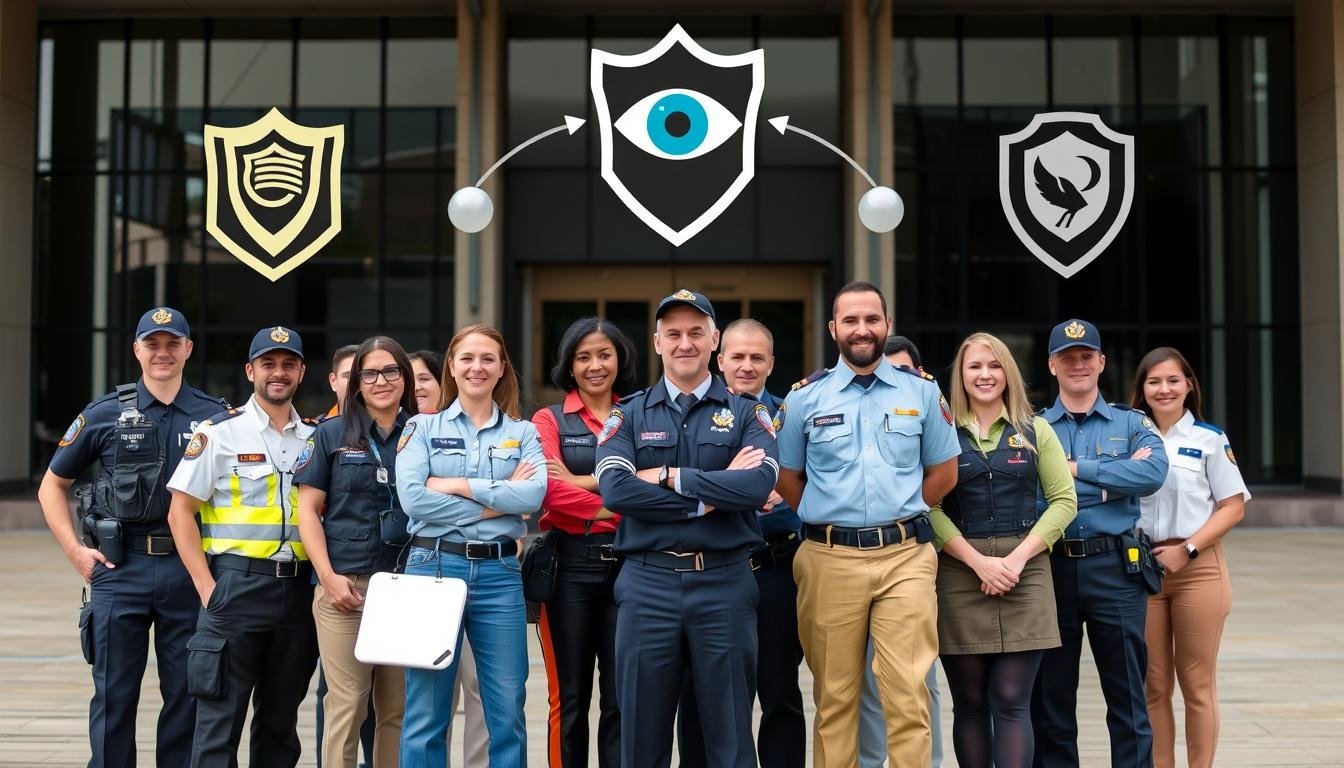Are you looking for a fulfilling career in a booming field? The allied security world is full of opportunities. It includes everything from basic security jobs to specialized roles. These jobs help keep people, businesses, and communities safe.
If you’re new to the job market or want to switch careers, this guide is for you. It will help you discover the exciting options in the allied security industry.
Key Takeaways
- The allied security industry offers a wide range of exciting job opportunities for those interested in safety and protection.
- Careers in allied security can provide competitive compensation, job stability, and opportunities for professional growth.
- Developing the necessary skills and qualifications can unlock a variety of roles, from security guards to specialized security analysts.
- Comprehensive training and certification programs are available to help you prepare for a successful career in allied security.
- The demand for skilled allied security professionals continues to grow, making it an increasingly attractive career path.
Explore a Rewarding Career in Allied Security
The allied security industry is booming, offering many career paths. You can work as a security guard or officer, or in investigations, loss prevention, and executive protection. This field lets you make a difference and grow your skills.
Unlock Exciting Opportunities in a Growing Industry
The allied security industry is growing fast. This is because more people and businesses want to be safe and manage risks. There’s a big need for skilled workers who can handle security challenges.
- Explore a diverse array of allied security careers, from entry-level to specialized positions.
- Capitalize on the security industry growth and take advantage of the increasing number of security job opportunities.
- Leverage your skills and expertise to contribute to the protection and well-being of individuals, organizations, and communities.
Develop Valuable Skills for Professional Growth
Allied security careers help you develop important skills. You’ll learn to observe, solve problems, and use new security technologies. These skills are useful in many industries.
“The allied security field provides a dynamic and rewarding career path for those interested in making a positive impact on the safety and security of their communities.”
Whether you’re starting out or looking for a new challenge, allied security has a lot to offer. There are many jobs to choose from. Start exploring and see where your career can take you in this exciting field.
What is Allied Security?
Allied security is a broad field that covers many services to keep people, assets, and data safe. It includes various security areas, offering a full safety plan for clients.
The core of allied security is to reduce risks and stop threats. It uses physical security, access control, cybersecurity, and intelligence. Allied security experts use advanced tech and planning to protect valuable things.
Unlike old security methods, allied security is proactive. It focuses on finding and fixing problems before they happen. This way, people and organizations can stay safe from many dangers.
The allied security field offers many services for different clients. This includes risk checks, security system design, and protecting executives. Its experts know a lot about security and how it changes.
The Evolving Landscape of Allied Security
The allied security world is always changing. New tech, global shifts, and threats keep it moving. As the world connects more, the need for good security grows. Allied security pros must keep up with new ways to fight threats.
Allied security is key in protecting important info, buildings, and famous people. They use the latest tech, training, and data to keep clients safe.
The allied security field keeps growing and is very important in the security world. It offers custom solutions and uses many skills to meet today’s safety needs.
The Allied Security Jobs Landscape
The allied security industry has many job roles. Each role has its own duties and needs. You can find jobs like security guards, investigators, and more. These jobs offer a chance to make a difference in a rewarding field.
Diverse Roles and Responsibilities
Security guards and officers are key in the industry. They protect people, property, and assets. They patrol, watch surveillance, and handle emergencies to keep places safe.
Investigators are important too. They do deep research to find clues and solve cases. They might work on fraud, cybersecurity, or corporate investigations. This helps companies stay safe from risks.
Loss prevention specialists aim to protect assets and prevent theft. They use surveillance and customer service to achieve this. These roles are vital in retail and logistics to keep assets safe.
Executive protection professionals look after famous people’s safety. They ensure personal security, manage travel, and set up security plans. Jobs in this area include bodyguards and protective intelligence analysts.
Key Qualifications for Allied Security Jobs
To succeed in the dynamic world of allied security, you need specific qualifications and skills. These include educational backgrounds, industry-recognized certifications, and key competencies. Employers look for these in their security professionals.
The security industry education and training needed varies. It often includes formal education, on-the-job training, and specialized certifications. Many employers want candidates with a bachelor’s degree in criminal justice or homeland security. They also look for skills like problem-solving, situational awareness, and effective communication.
Security certification requirements are also key. They show an individual’s expertise and commitment. Certifications like the Certified Protection Professional (CPP), Physical Security Professional (PSP), and Certified Security Supervisor (CSS) are highly valued.
| Key Qualifications | Description |
|---|---|
| Educational Background | Bachelor’s degree in criminal justice, homeland security, or a related field |
| Specialized Certifications | Certified Protection Professional (CPP), Physical Security Professional (PSP), Certified Security Supervisor (CSS) |
| Essential Skills | Problem-solving, situational awareness, effective communication, attention to detail |
By meeting these allied security job qualifications, you can stand out in the growing security industry. You’ll be ready to contribute your expertise and make a difference in your career.
Allied Security Jobs: Finding the Right Fit
Exploring allied security jobs means finding a role that matches your skills and interests. This guide will help you assess your strengths, find your interests, and discover the right job for you.
Matching Your Skills and Interests
Start by looking at your skills and what you enjoy. List your strengths, like attention to detail or problem-solving. Think about what gets you excited in security work, like protecting important places or analyzing risks.
Then, look at the many allied security jobs out there. Jobs range from security consulting to cybersecurity. Read job postings to see if they fit your skills and goals.
- Assess your strengths and areas of interest
- Explore the diverse range of allied security job opportunities
- Identify the roles that align with your skills and professional goals
By carefully matching your skills and interests with job opportunities, you’ll find a career that’s rewarding and fulfilling.
Training and Certification for Allied Security Professionals
In the dynamic allied security industry, learning and skill growth are key for success. There are many allied security training and security certification programs to help professionals grow. These range from basic security guard training to advanced certifications in investigations and management.
The security guard training course is a foundational program. It teaches the basics needed to work as a security officer. Topics include legal powers, report writing, and emergency response. This training gives security personnel the tools to do their jobs well.
- Security Guard Training
- Certified Protection Officer (CPO)
- Certified Security Supervisor (CSS)
- Certified Incident Investigator (CII)
- Certified Executive Protection Specialist (CEPS)
For those wanting to specialize, there are many security professional development options. Certifications like the CPO, CSS, and CII show a person’s expertise. The CEPS certification is for those who want to protect executives and VIPs.
“Continuous education and certification are essential for staying competitive in the dynamic allied security industry. Investing in your professional development not only enhances your knowledge and skills but also signals your dedication to employers and clients.”
By getting allied security training and security certification programs, professionals show their commitment. They stand out in the job market and are ready for career growth in the allied security industry.
Career Advancement Opportunities in Allied Security
The allied security industry is full of chances for career growth. As you gain experience and skills, you can move into leadership roles. These roles let you have a bigger impact in the field.
Unlocking New Horizons with Experience
With hard work and a love for learning, you can climb the ranks in allied security. You can move into roles like:
- Security Manager: Oversees security operations, manages teams, and follows industry rules.
- Security Director: Creates security plans, talks to stakeholders, and brings new ideas to the table.
- Chief Security Officer (CSO): A top executive who handles security strategy, risk, and crisis management.
These security leadership roles and security management positions come with big responsibilities. They also let you make a big difference in the security industry and the places you work. By using your knowledge and showing you can do well in allied security career advancement, you can find new and exciting security industry promotion opportunities.
“With the right experience and dedication, allied security professionals can ascend to influential leadership roles, shaping the future of this dynamic field.”
As you keep growing and improving your skills, the allied security industry offers a clear path for career advancement. You can face bigger challenges, earn more, and help keep your community safe.
Benefits of Working in Allied Security
Allied security jobs offer a chance to make a real difference. They also come with great benefits. You can earn a good salary and enjoy job stability and growth opportunities.
Competitive Compensation and Job Stability
Working in the security industry means better pay and benefits. Allied security workers often earn more than the national average. The security industry job outlook shows more growth and higher earnings ahead.
There are also great benefits like healthcare and retirement plans. These perks make the job more satisfying and secure financially.
- Competitive allied security job benefits, including attractive salaries and comprehensive benefits
- Excellent job stability and opportunities for career advancement
- Chance to contribute to the safety and security of communities and organizations
Allied security jobs also give you a sense of purpose. You get to protect people and valuable assets. This is crucial for public safety and keeping organizations safe.
“A career in allied security allows you to make a meaningful impact while also enjoying a stable, well-compensated profession. It’s a win-win for those who are passionate about safeguarding people and property.”
The security industry job outlook is promising. With many allied security job benefits, more people are choosing this career path.
Allied Security Job Search Tips
Looking for a job in the allied security industry can be both rewarding and tough. We’ve put together some useful tips and strategies to help you find your ideal how to find allied security jobs.
Craft a Compelling Resume
Your resume is your first chance to impress employers. Make sure it highlights your relevant skills, experiences, and qualifications for security job application tips. Customize your resume for each job, focusing on the skills that match the role.
Leverage Your Network
- Connect with industry contacts, colleagues, and past coworkers for security industry networking. They might know about jobs that aren’t advertised or can share insights on the hiring process.
- Go to industry events, conferences, and networking sessions to meet professionals in allied security.
- Use professional social media like LinkedIn to grow your network and find job leads.
Stay Informed and Proactive
Keep up with the latest security job search strategies by regularly checking job boards, company websites, and industry publications. Set up job alerts to get notified about new openings that fit your skills and interests.
By following these tips, you’ll be ready to tackle the allied security job market. You’ll be on your way to finding the perfect job to start or grow your career.
Preparing for Allied Security Job Interviews
The job interview is a key part of getting hired in allied security. It’s your chance to show off your skills, experience, and how well you fit the job. To stand out, it’s crucial to prepare well. Here are some tips to help you shine in your allied security job interview:
Master Common Interview Questions
Look up security industry interview questions and practice your answers. Be ready to talk about your background, skills, and why you’re the best security job candidate. Expect questions about solving problems, paying attention to details, and following safety rules.
Highlight Relevant Skills and Experiences
Read the job description carefully and find out what’s needed for the allied security job. Think of examples that show how you’re ready for the role. Talk about your ability to handle stress, work with a team, and adjust to new situations.
Make a Lasting Impression
On interview day, arrive early, dress up, and be confident and positive. Listen well, ask smart questions, and show you really want the job. Making a good impression can help you get the allied security job you want.
“Preparation is the key to success in any job interview, and that’s especially true in the allied security field. By showcasing your relevant skills and experiences, you’ll position yourself as a top-tier candidate.”
With the right security interview tips and allied security job interview preparation, you’ll impress employers and get your dream job in allied security.
Conclusion
The allied security industry offers many exciting and rewarding jobs. You can choose from traditional security roles, specialized investigative work, or executive protection. This diversity lets you make a difference and grow your skills.
Understanding the qualifications, training, and career paths is key. This knowledge helps you find the right allied security job for your goals.
The demand for skilled security professionals is growing. As an allied security worker, you’ll play a crucial role in keeping people and assets safe. You’ll also enjoy good pay and job security.
Start your journey in allied security today. Discover the next chapter of your career.
The allied security field is full of possibilities. Use your strengths, get the right training, and keep up with industry changes. This will lead you to a fulfilling and successful career.
FAQ
What is allied security?
Allied security covers a wide range of services to protect people, assets, and information. It includes traditional security roles and specialized areas like investigations and executive protection.
What are the diverse roles and responsibilities in allied security?
The allied security field has many job roles. These include security guards, investigators, and loss prevention specialists. Each role has its own set of responsibilities.
What key qualifications are required for allied security jobs?
To do well in allied security, you need certain qualifications. These include education, training, and certifications. You also need skills like problem-solving and communication.
How can I find the right allied security job that fits my skills and interests?
To find the right job, know your strengths and interests. Look at different allied security jobs. Use job postings and network to find the best fit.
What training and certification opportunities are available for allied security professionals?
There are many training and certification options for allied security professionals. These range from basic security guard training to advanced courses in investigations and management.
What are the career advancement opportunities in allied security?
Allied security offers many chances to grow your career. With experience, you can move into roles like security manager or director.
What are the benefits of working in allied security?
Allied security jobs come with good pay, job stability, and benefits. You can expect competitive salaries, health benefits, and chances for advancement.
How can I effectively search for and prepare for allied security job interviews?
To find and prepare for interviews, start by looking for job openings. Make a strong resume and network. Practice answering common questions and show off your skills and experiences.





